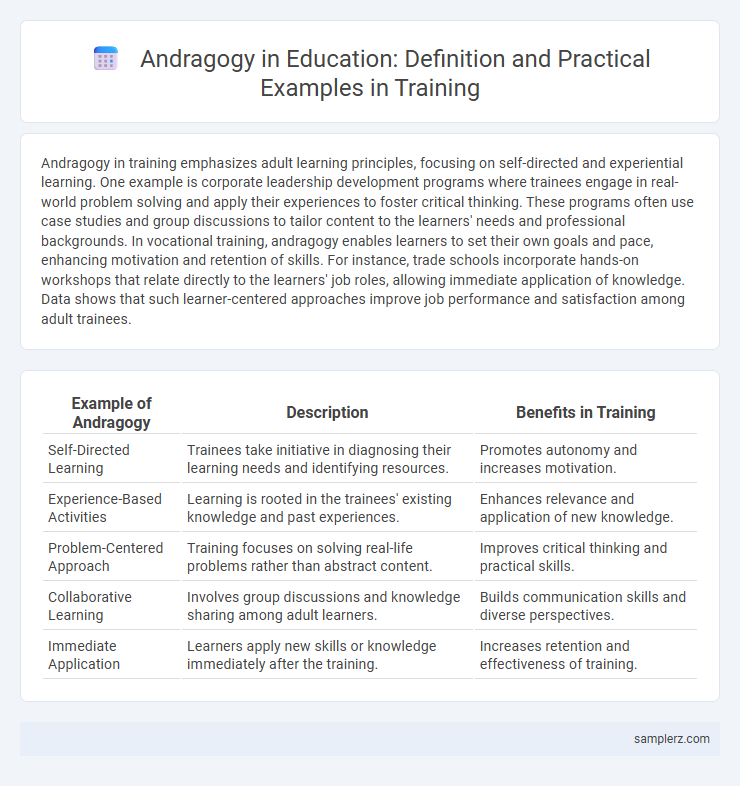Andragogy in training emphasizes adult learning principles, focusing on self-directed and experiential learning. One example is corporate leadership development programs where trainees engage in real-world problem solving and apply their experiences to foster critical thinking. These programs often use case studies and group discussions to tailor content to the learners' needs and professional backgrounds. In vocational training, andragogy enables learners to set their own goals and pace, enhancing motivation and retention of skills. For instance, trade schools incorporate hands-on workshops that relate directly to the learners' job roles, allowing immediate application of knowledge. Data shows that such learner-centered approaches improve job performance and satisfaction among adult trainees.
Table of Comparison
| Example of Andragogy | Description | Benefits in Training |
|---|---|---|
| Self-Directed Learning | Trainees take initiative in diagnosing their learning needs and identifying resources. | Promotes autonomy and increases motivation. |
| Experience-Based Activities | Learning is rooted in the trainees' existing knowledge and past experiences. | Enhances relevance and application of new knowledge. |
| Problem-Centered Approach | Training focuses on solving real-life problems rather than abstract content. | Improves critical thinking and practical skills. |
| Collaborative Learning | Involves group discussions and knowledge sharing among adult learners. | Builds communication skills and diverse perspectives. |
| Immediate Application | Learners apply new skills or knowledge immediately after the training. | Increases retention and effectiveness of training. |
Key Principles of Andragogy in Modern Training
Modern training programs apply key principles of andragogy by emphasizing self-directed learning, leveraging learners' prior experiences, and ensuring immediate relevance of content to real-world tasks. Facilitators design interactive modules that encourage critical thinking, practical problem-solving, and collaborative learning among adults. Emphasizing intrinsic motivation, these training sessions foster autonomy and active participation, aligning with Malcolm Knowles' foundational andragogical framework.
Real-World Applications of Andragogy in Adult Learning
Incorporating real-world applications within adult learning environments exemplifies andragogy by emphasizing problem-solving and practical experiences relevant to learners' careers. Case studies, simulations, and role-playing exercises engage adults by connecting theoretical concepts to everyday challenges they face in professional settings. This approach enhances retention and motivation by making learning immediately applicable and self-directed.
Case Studies: Andragogy in Corporate Training
Case studies in corporate training often showcase andragogy by emphasizing problem-solving, collaboration, and real-world application tailored for adult learners. These examples highlight how interactive scenarios and experiential learning cater to adults' prior knowledge and intrinsic motivation. Companies like IBM and Deloitte apply case-based methods to enhance critical thinking and skill retention in professional development programs.
Interactive Andragogical Methods for Professional Development
Interactive andragogical methods such as case studies, role-playing, and group discussions enhance professional development by engaging adult learners in practical problem-solving and critical thinking. These strategies promote experiential learning, allowing participants to draw upon their prior experiences and apply new knowledge directly to workplace scenarios. Incorporating technology-enabled simulations and real-time feedback further supports skill acquisition and retention in professional training programs.
Transformative Learning: Andragogy in Action
Transformative learning in andragogy emphasizes critical reflection and experiential learning to help adults challenge their existing beliefs and develop new perspectives. In professional training programs, facilitators engage learners in meaningful discussions and real-world problem-solving, promoting deep cognitive shifts that enhance personal and professional growth. This approach encourages autonomy and active participation, enabling adult learners to apply transformative insights directly to their work contexts.
Designing Effective Workshops Using Andragogical Approaches
Designing effective workshops using andragogical approaches involves leveraging adult learners' prior experiences and promoting active participation through problem-solving activities. Facilitators incorporate self-directed learning techniques and real-world applications to enhance engagement and knowledge retention. Tailoring content to meet adults' intrinsic motivations and learning styles ensures practical and impactful training outcomes.
Best Practices: Facilitating Adult Learning Through Andragogy
Effective facilitation of adult learning through andragogy emphasizes practical application, leveraging learners' prior experiences to enhance relevance and engagement. Best practices include creating interactive sessions that encourage self-directed learning and critical reflection, fostering autonomy and deeper understanding. Incorporating collaborative problem-solving and real-world scenarios ensures adults actively construct knowledge tailored to their personal and professional contexts.
Technology Integration: Andragogy in E-Learning Environments
Andragogy in e-learning environments emphasizes technology integration by utilizing interactive multimedia tools and adaptive learning platforms tailored to adult learners' experiences and goals. Platforms like Moodle and Coursera incorporate real-time feedback, collaborative forums, and personalized content that align with andragogical principles, enhancing engagement and knowledge retention. This learner-centered approach supports self-directed learning and practical application, critical for adult education success in digital contexts.
Success Stories: Adult Learners Benefiting from Andragogical Training
Adult learners in corporate training programs show significant skill advancement when andragogical principles are applied, such as self-directed learning and problem-solving tasks. Case studies reveal increased job performance and career progression among participants who engage in experiential learning modules tailored to their professional needs. Organizations report higher employee retention rates and productivity improvements linked to andragogy-based training interventions.
Evaluating Training Outcomes Through Andragogical Models
Evaluating training outcomes through andragogical models emphasizes self-assessment and reflective practices among adult learners, aligning with Malcolm Knowles' principles of adult education. Utilizing tools like feedback surveys and competency tests tailored to adults' experiences enables precise measurement of skill acquisition and behavioral change. Incorporating experiential learning evaluations ensures that training effectiveness is linked to real-world application and ongoing personal development.

example of andragogy in training Infographic
 samplerz.com
samplerz.com